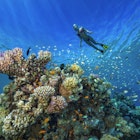
6 unforgettable beaches in Oman for every type of traveler

Jan 30, 2022 • 7 min read

Oman's landscape offers far more than just desert dunes, and you can explore the country's most beautiful beaches © PepiteVoyage / Getty Images
First-time visitors to Oman might be surprised to learn that the range of natural landscapes in the country isn’t limited to undulating desert dunes, lush palm oases and rugged limestone mountains – the country’s 3165km-long coastline is dotted with sun-bleached swaths of white sand, rocky beaches and pristine islands where turtles outnumber people and pods of dolphins swim alongside boats.
If creature comforts are important, then the beach resorts in Oman or the city beaches, with tourism infrastructure and public facilities (such as toilets and changing rooms) are your best bet. But intrepid travelers who like to explore off the beaten path will find glorious stretches of nearly empty beaches, some hidden in coves and beside caves that make for a memorable wild camping experience.
If you’re the adventurous sort, Oman is known for some of the most spectacular diving and snorkeling sites in the region, and watersports such as kiteboarding, surfing, kayaking and fishing are all on offer here too.

Qurum Beach
Best public beach in Muscat
Located in the upscale suburb of Qurum, Qurum Beach, also known as Shati Al Qurum, is among the best beaches in Muscat and a good choice for those looking to enjoy a beach day in the heart of the city. This 4km-long sandy beach with swaying palms is popular with joggers running on the promenade in the mornings and groups who come to watch the sunset. The beach is safe to swim in, but watch out for high tide warnings. Operators like and Nimer Tourism offer kayak and jet ski rentals.
To grab a bite, choose from one of many cafes and restaurants along the beach. Public toilets and changing rooms are available. The nearby Qurum Natural Park, with walkways around a small lake, rose garden, amphitheater and an amusement park for kids, also makes for a lovely visit.
Tiwi Beach
Best beach for secluded camping
Full of smooth, shiny pebbles and soft white sand, Tiwi Beach is a worthy stop for travelers returning from a day of scrambling over rocky terrain on hikes in Wadi Shab or Wadi Tiwi, or those looking to swim in clear blue waters close to the coastal town of Sur. While Tiwi Beach is a popular camping spot for locals on the weekends, you just might have a long stretch all to yourself during the week. Tiwi Beach is sometimes also referred to as Pebble Beach.
To set up a tent or a picnic, choose from secluded spots sheltered in the cove or go farther south along the beach. There are some interesting rock formations and caves, including a heart-shaped cave at the northern end of the beach just after the Wadi Shab Resort, with a lookout over the sea. There are no tourist facilities or shops at Tiwi Beach, so it’s best to stock up on snacks and supplies in the nearby fishing village of Tiwi or in the port town of Sur.

Masirah Island
Best beach for turtle spotting and kitesurfing
Masirah Island is Oman’s largest island, and while it’s located just 16km (10 miles) off the country’s southeastern coast, the travel time of six hours from Muscat (a five-hour road trip to Shannah Port and an hour on the ferry) means that it slips under the radar for many visitors. The coast here is home to fishing villages and miles of pristine sandy beaches that hug the turquoise waters of the Arabian Sea. Don’t miss the beach at Abu Rasas in the south, where the shallow waters of the west coast meet the raging sea from the east.
In summer, the island’s beaches are known to be a popular nesting site for migrating sea turtles to lay their eggs, making hatching season a good time to visit (September to December). If you’re camping on the beach, set your tent up away from the turtle nests, which look like holes in the sand with tire tracks leading to them, and don’t use bright lights or attempt flash photography (use flashlights with red light). In addition to being the world’s largest nesting grounds for loggerhead turtles, at Masirah Island, you’ll have the chance to spot other species of sea turtles found in Omani waters such as the green turtle, olive ridley turtle and leatherback turtle.
During the monsoon season, kitesurfers head to the island’s flatwater beaches, such as Sur Masirah, Gshar Sheikh and Ghab on the west coast to make the most of strong, steady winds. Masirah Beach Camp, in Sur Masirah Bay, offers budget accommodations, kitesurfing lessons and equipment rentals.
Other activities to do around the island are birdwatching, snorkeling, surfing, fishing and diving trips, and these can be arranged by the Masirah Island Resort. The beach outside the resort is open to visit even if you’re not staying there – just bring food and essentials and set up in one of the picnic huts.
Al Mughsail Beach
Best beach for families
A 30-minute drive from Salalah, which attracts tourists to the Dhofar region from June to September with its monsoon-drenched landscapes, Al Mughsail Beach is popular with picnicking families – and with good reason. A stroll along the white sand beach, among the best beaches in Salalah, rewards with sublime views of rugged cliffs over the azure sea.
The views in both directions get even better when you wander towards Al Marneef Cave, at the western end of the beach. From here, a walkway leads down to what makes this beach a hit with families: the Mughsail Blowholes, where jets of seawater dramatically erupt from vents in the rocks and reach heights of several meters, especially during the khareef (monsoon) season. A few picnic shelters are scattered along the beach with designated barbecue areas, and a cafe next to Al Marneef Cave.

Mirbat
Best beach for diving
The fishing village of Mirbat, once an important frankincense trading port in the Dhofar region, is one of the most rewarding spots for snorkeling and diving in the country (October through April). These cool, clear nutrient-rich waters off the southern coast of Oman are teeming with rays, lobsters, moray eels, guitarfish and cuttlefish. With more than 20 dive sites, shipwrecks, kelp forests and beautiful coral reefs, Mirbat offers abundant opportunities for divers of every experience level.
From November, you might find yourself in the company of humpback whales and dolphins while on a diving or snorkeling trip. On sandy Mirbat Beach, , within the , organizes guided snorkeling and diving trips in the area, as well as equipment rental.

Daymaniyat Islands Nature Reserve
Best beach for snorkeling
The Daymaniyat Islands are an archipelago of nine rocky limestone islands just 19km (12 miles) off the northern coast of Oman and can easily be reached by boat from Muscat in under an hour. You might be tempted to spend all your time here relaxing on the white sandy beaches, but the true highlight of these uninhabited islands, which are a protected nature reserve, lies under the clear, warm waters around them.
Blessed with vibrant coral reefs, these waters bestow sightings of Arabian butterflyfish, angelfish, pufferfish, parrotfish, clownfish, turtles, eels, rays, and even dolphins, whale sharks and humpback whales upon snorkelers and divers. Many sites with shallow waters, thriving with marine life, are suitable for snorkeling. The islands are a nesting site for green and hawksbill turtles and migratory birds such as ospreys and sooty terns. Visitors are not allowed to disembark on the islands from May through October, as a conservation measure.
Because a permit is required to visit the islands, it’s best to visit with operators such as and , which can not only arrange permits but also guide you to the best sites for snorkeling and diving. From November to February, it’s possible to camp on the islands, but you’ll need a permit arranged through the dive centers.
You may also like:
10 must-see natural wonders in Oman
This is when Oman will reopen its borders to tourists
The 8 best places to visit in Oman: rugged mountains, seaside towns and culture-rich cities
Explore related stories









